Imagine having an AI handle your calls, transfer callers to the right person, or transcribe your voicemails into text.
Sounds too good to be true, right?
Well, that's exactly what AI answering services can do for you.
But with the recent boom in AI, finding the right AI voice answering service can be challenging. In this article, we review five AI services we recommend to help you choose the one that best fits your needs.
Summary
Here's what we found during our investigation:
- Allo, which offers flat pricing and affordable plans, is the best option for companies looking for an AI answering service that doesn’t break the bank.
- Smith.ai, which relies on both human agents and AI, is the best choice for companies that aren’t ready to let AI handle 100% of their calls.
- Slang.ai, which specializes in hospitality and integrates with restaurant booking solutions, is the best option for restaurants.
- Sona is ideal for companies already using Quo as their phone system.
- IsOn24 and Rosie, which are affordable and easy to use, are great for small businesses that want to limit complexity.
- Goodcall, which offers deep customization options, is a strong fit for companies that want full control over their answering service configuration.
Why you can trust our selection
Before finalizing this selection, we personally tested 15 AI phone answering services in real business scenarios.
Our evaluation focused on the following criteria:
- Pricing: Affordability, predictable costs, and the availability of a free trial.
- Customizability: The ability to adjust settings and deliver a truly personalized experience.
- Reliability: Consistent performance with minimal delays or call disruptions.
- Voice quality: Natural, human-like speech that enhances the caller experience.
- International coverage and languages: Broad geographic reach and multilingual support.
- Compliance: Full adherence to HIPAA and GDPR standards.
We also analyzed reviews on platforms such as G2, Capterra, and Trustpilot to complement our own findings.
Let’s continue with our in-depth review.
Side-by-Side Comparison of AI Answering Systems
Allo - Best for Small Businesses
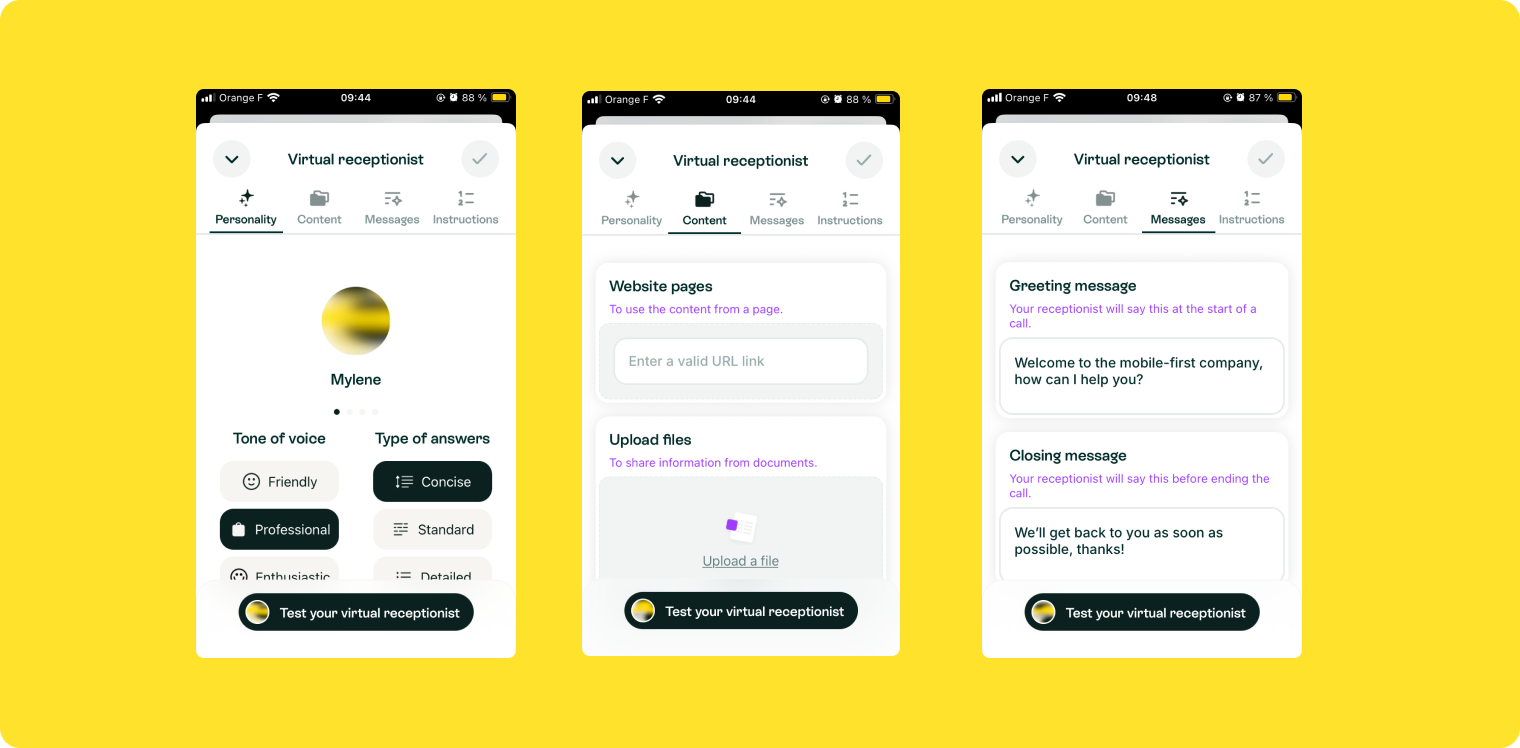
What is Allo?
Allo is an AI-powered phone system that includes a built-in AI answering service.
Launched in 2024, it’s one of the newest solutions featured in our selection.
Why does Allo’s AI answering service stand out?
Allo is a relatively new player in the field, launched in 2024.
But a few things caught our attention and convinced us to rank it at the top of our selection:
- Easy to customize: Personalize your greeting and closing messages, choose a tone of voice (friendly, professional, or enthusiastic), and select an answering style (concise, standard, or detailed).
- Natural-sounding voices: Allo features realistic, human-like voices, making AI interactions feel more natural than with most competing services.
- Summaries and recordings: All calls handled by the AI assistant are recorded and transcribed for easy review.
- Learns from you: Allo’s AI can be trained on your website or uploaded documents. You can also provide plain-text details about your company so the assistant can respond to callers more accurately.
- Easy to connect: Allo integrates with Zapier and offers a dozen native integrations, including HubSpot, Salesforce, Attio, Notion, and Google Workspace.
- International-ready: Allo supports English, French, and Spanish, and is available in both North America and Europe.
Allo Pricing
Allo offers two plans:
- Starter: $25/month per user; includes 30 minutes of AI receptionist usage.
- Business: $45/month per user; includes unlimited AI answering.
A 7-day free trial is available to test the service.
%2015.44.06.png)
Pros & Cons of Allo
Who Is Allo Best For?
Allo’s AI capabilities make it ideal for teams that want more than a basic message-taking service. Its flat pricing ensures cost predictability for small businesses, and as a full phone system, it’s an excellent choice for those ready to upgrade from their current setup.
Demo of Allo
Smith.ai - Best for companies not yet ready to go fully AI

What is Smith.ai?
Founded in 2015, Smith.ai was created for businesses that need 24/7 call coverage but aren’t ready to rely entirely on AI answering services.
It’s the only provider in our selection that combines human operators with AI.
Why does Smith.ai’s AI answering service stand out?
During our tests of Smith.ai, four things stood out:
- AI + Humans: Smith.ai is the only solution we reviewed that blends AI with human receptionists. The AI handles routine tasks, while human agents take over for more complex conversations.
- North American agents: All virtual receptionists are based in the U.S., making it ideal for companies that value credibility and native-level communication.
- Outbound campaigns: Human agents can also place outbound calls on your behalf.
- Easy to connect: Smith.ai integrates with Zapier and Make, and offers several native integrations, including HubSpot, Salesforce, and Calendly.
Smith.ai Pricing
Likely due to its use of human operators, Smith.ai is the most expensive solution we reviewed.
According to its website, there are three public plans:
- Starter: 50 calls for $95/month, with a $2.40 overage per additional call.
- Basic: 150 calls for $270/month, with a $2.30 overage per additional call.
- Pro: 500 calls for $800/month, with a $2.10 overage per additional call.

Pros and cons of Smith.ai
Who Is Smith.ai Best For?
Smith.ai is best suited for businesses that need 24/7 coverage, prefer a mix of AI and human receptionists, and are willing to invest a higher budget for premium service quality.
Demo of Smith.ai
Goodcall - Best for Companies That Want Control
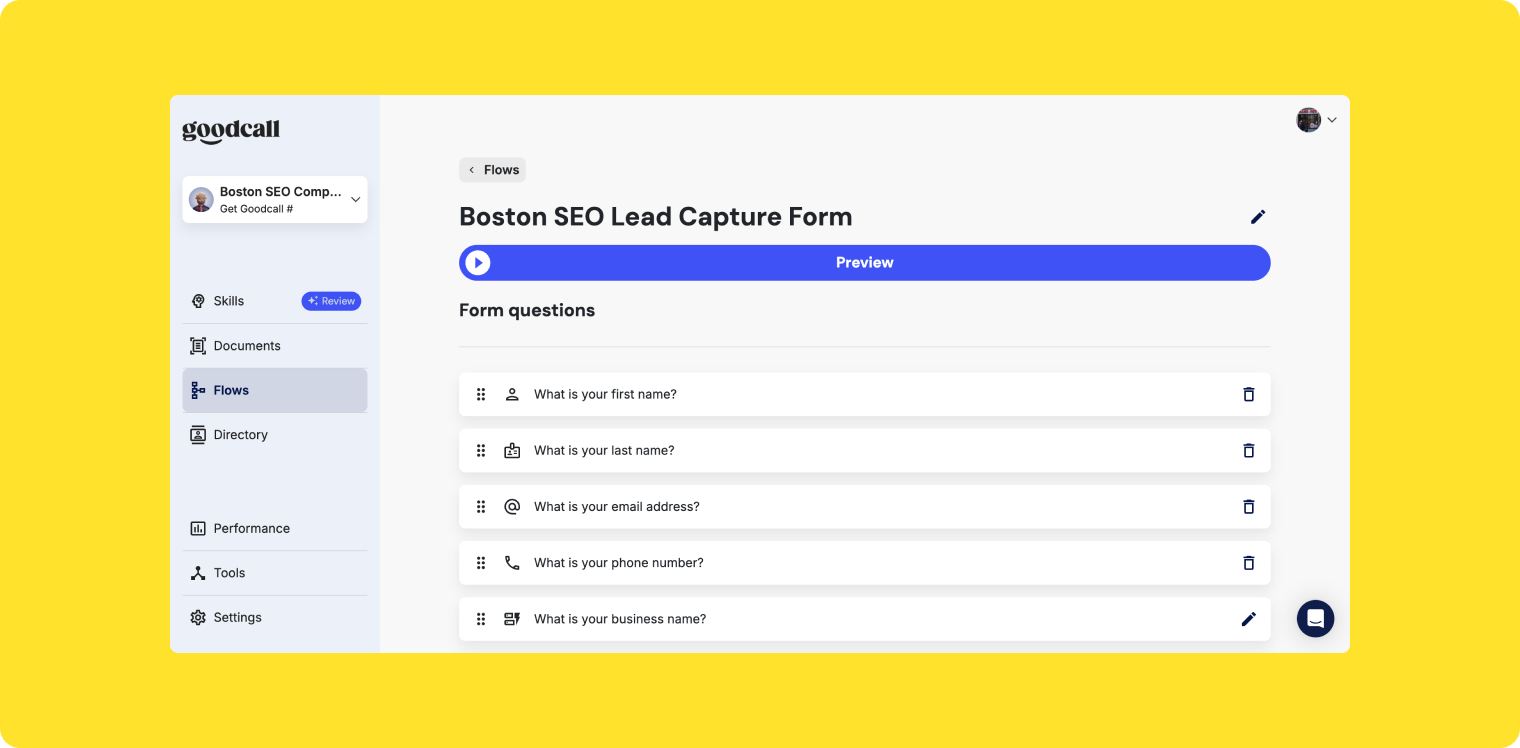
What is Goodcall?
Goodcall is one of the most advanced AI answering services we tested.
Its goal is to eliminate unnecessary calls altogether by allowing callers to book appointments online, share their contact details, or get instant answers based on the training materials you provide.
Why does Goodcall’s AI answering service stand out?
The following elements caught our eye during our review of Goodcall:
- Deep customization and control: Goodcall provides a powerful workflow builder that allows you to precisely configure each step of the call process.
- Lead collection: Goodcall can capture lead information directly during calls and lets you define which questions callers must answer.
- Integrations: Goodcall connects with Google Voice and Zapier for easy workflow automation.
- HIPAA compliant: It meets HIPAA standards, making it suitable for healthcare and other privacy-sensitive businesses.
Goodcall Pricing
Goodcall offers three plans:
- Starter: $79/month per agent; includes 100 unique customers monthly; $0.50 per additional customer.
- Growth: $129/month per agent; includes 250 unique customers monthly; $0.50 per additional customer.
- Scale: $249/month per agent; includes 500 unique customers monthly; $0.50 per additional customer.
In Goodcall’s pricing model, an agent refers to a phone number, and customers are linked to that specific number. This makes Goodcall more expensive than Allo but far cheaper than Smith.ai or traditional answering services.
The service can be tried free for 14 days (no credit card required).
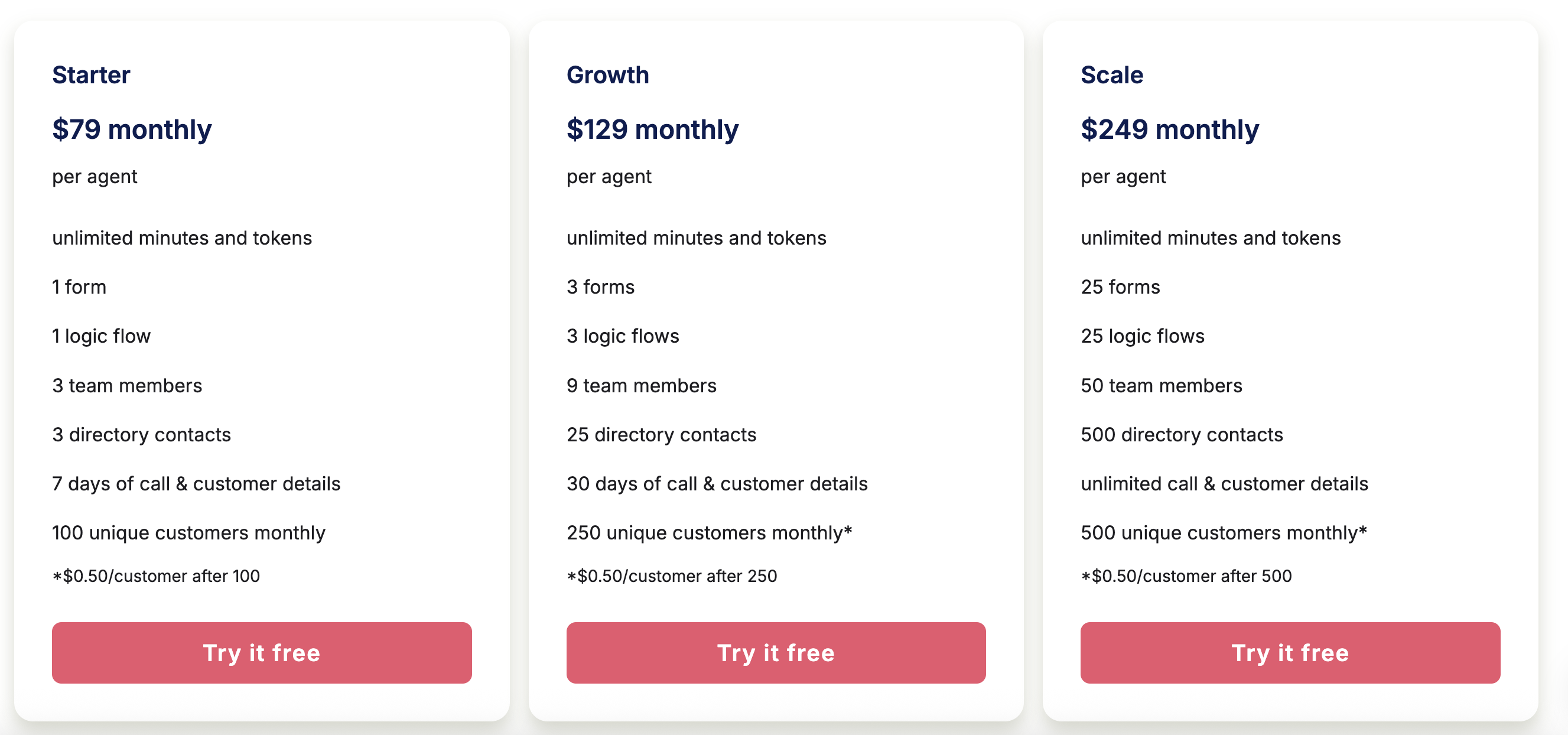
Demo of Goodcall
Pros and cons of Goodcall
Who Is Goodcall Best For?
Goodcall is ideal for companies that want to drastically reduce incoming call volume while still providing quick, automated assistance and seamless lead capture.
Given the depth of its settings, it’s also a strong choice for teams that want more control over how their calls are handled.
Rosie - Best for Small Businesses on a Budget
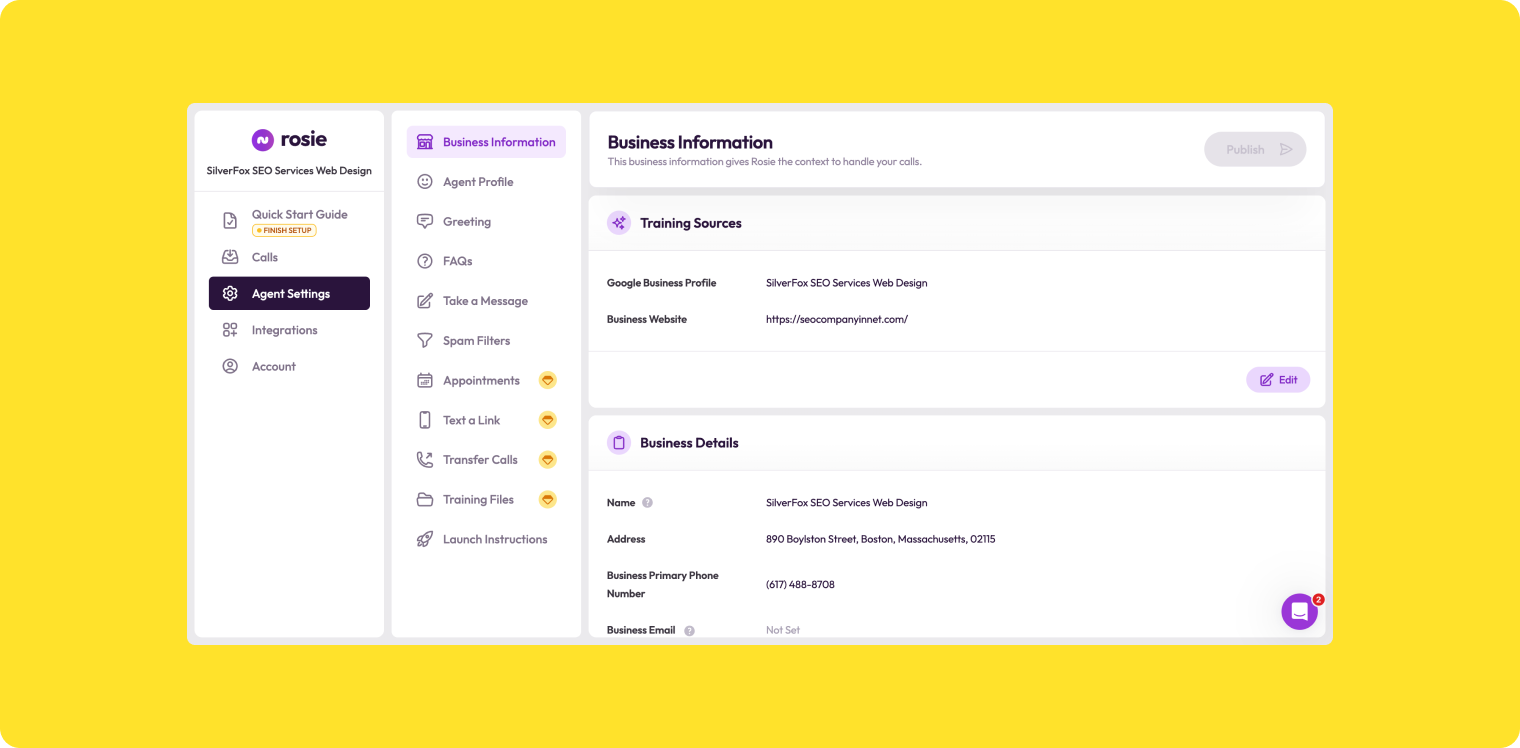
What is Rosie?
Rosie is an AI phone answering service designed for small businesses that can’t answer every call but lose too many leads when calls go to voicemail.
It answers basic questions, takes messages, and notifies you when follow-ups are needed.
Why does Rosie’s AI answering service stand out?
We noticed the following strengths when reviewing Rosie:
- Learns from your existing assets: Rosie scans your website and Google Business Profile to train its AI.
- Customizable: You can create FAQs, customize greeting messages, and, on advanced plans, upload internal documents such as pricing sheets to improve accuracy.
- AI-native features: Provides instant notifications and AI-generated call summaries after each conversation.
- Integrations: Connects with over 8,000 apps via Zapier.
- Affordable pricing: Simple, predictable plans with no hidden add-ons.
Rosie Pricing
Rosie offers three plans:
- Professional: $49/month; message taking with custom questions.
- Scale: $149/month; includes appointment links, call transfers, and text replies.
- Growth: $299/month; includes the ability to upload your own files for training.
All plans include unlimited minutes and message taking, and Rosie offers a 7-day free trial.
With its unlimited minutes, Rosie’s Professional plan is the most affordable option among all the services we reviewed.
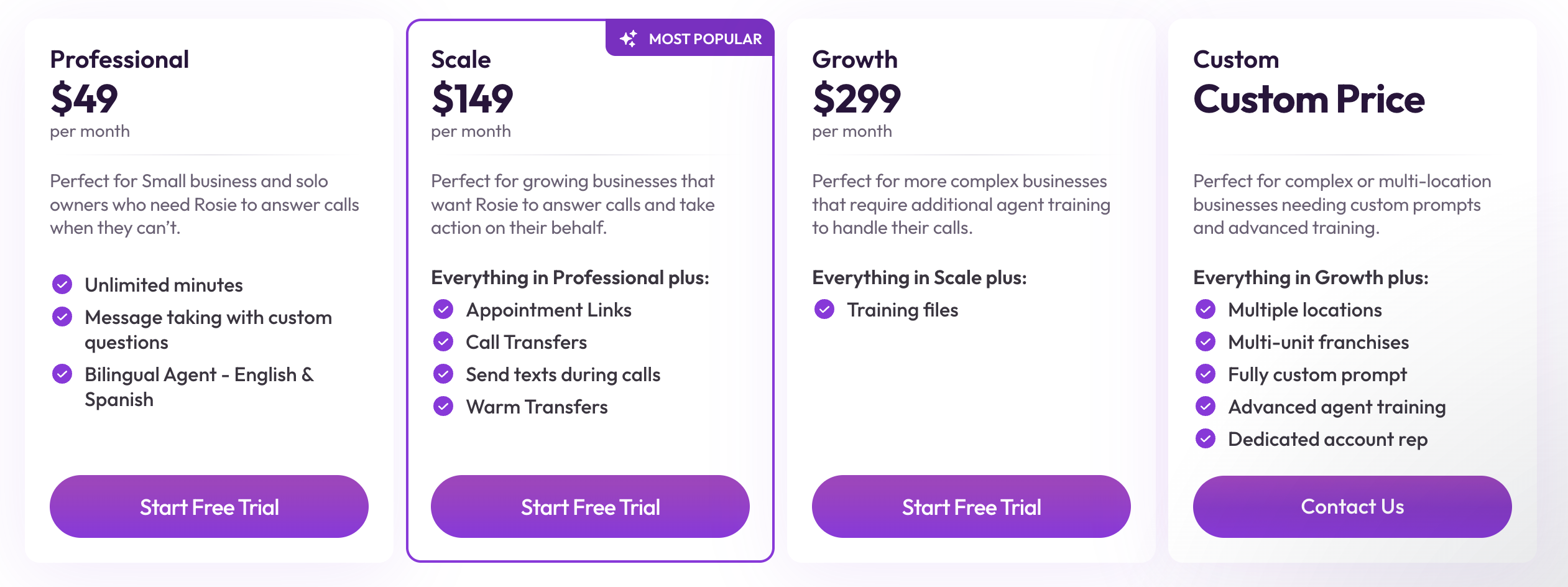
Pros and cons of Rosie
Who Is Rosie Best For?
Rosie’s flat-rate, affordable pricing and ease of use make it ideal for small businesses seeking a smarter alternative to voicemail.
Its higher-tier plans are a strong fit for companies that want their AI answering service to do more than just take messages.
Demo of Rosie
Sona (by Quo) - Best for Teams Already Using Quo
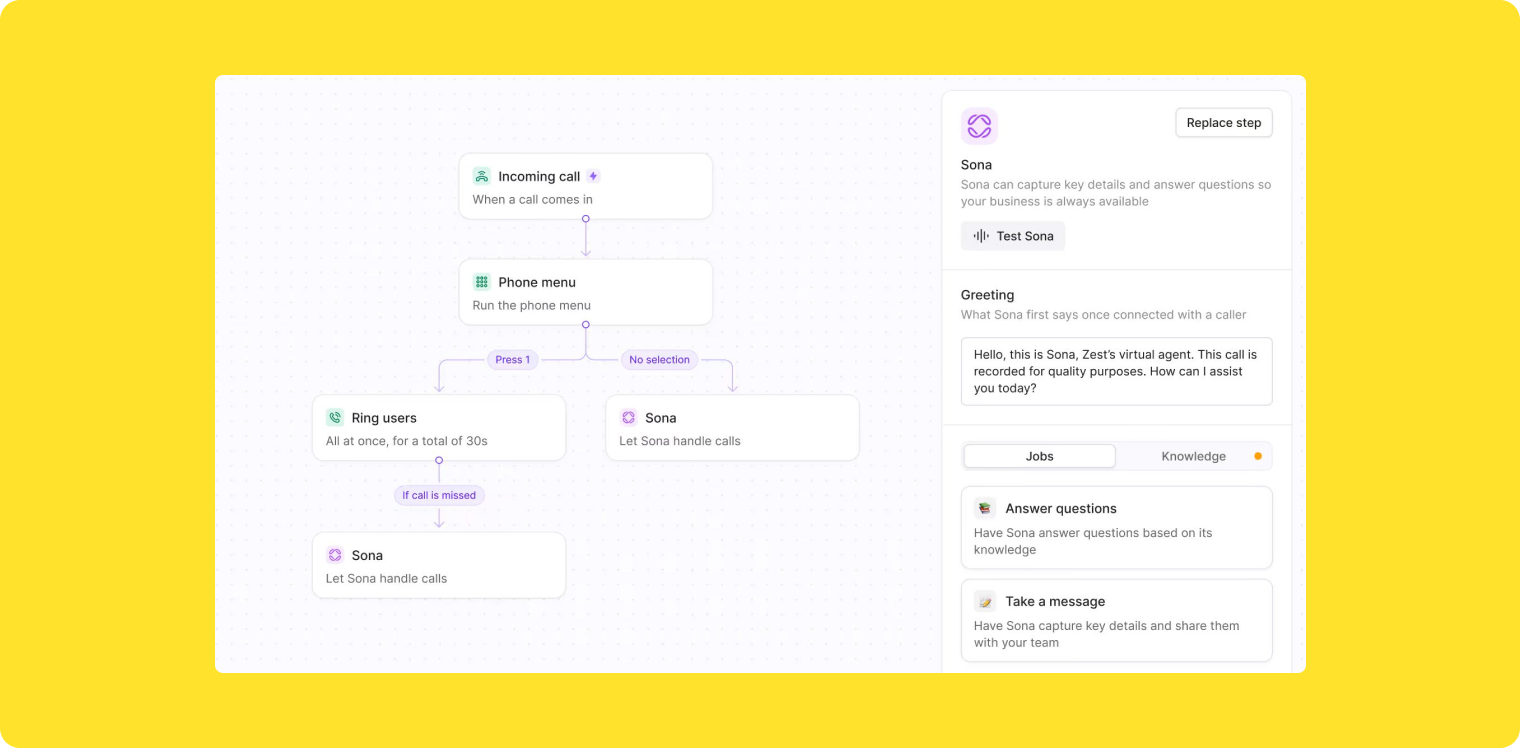
What is Sona?
Like Allo, Quo (formerly OpenPhone) is a full-fledged phone system that includes a built-in AI answering service (Sona).
Sona is designed for businesses that need more than call handling, offering features such as team collaboration, text messaging, and call recording.
Sona is part of the Quo platform, which means you’ll need an active Quo subscription to use it.
Why does Sona’s AI answering service stand out?
During our tests, the following strengths stood out:
- Customizable workflows: Choose what happens at each step of a call (when to transfer, send to voicemail, or collect contact details).
- Automatic SMS: Sona can send links, forms, or directions to callers during the conversation.
- Natural-sounding voices: Delivers lifelike, human-like speech for smoother caller interactions.
- Highly configurable: Set operating hours, create detailed FAQs, introduce team members, and define products or services.
- AI summaries and transcripts: Every call handled by Sona includes a transcript and summary, even if your Quo plan doesn’t include these features.
Sona Pricing
Sona is available as an add-on to a Quo subscription (starting at $19/month per user).
All Quo plans include 10 AI-handled calls for free, then:
- $25/month for 40 calls
- $49/month for 100 calls
- $99/month for 250 calls
- $199/month for 600 calls
While Quo offers a free trial, Sona itself cannot be tested for free during that period.
Pros and cons of Sona
Who Is Sona Best For?
Sona is ideal for businesses already using Quo that want an English-speaking AI assistant with strong customization options and integrated collaboration tools.
It’s particularly well-suited for teams that want to automate routine calls without losing context or call quality.
Demo of Sona
IsOn24 - Best for Microbusinesses
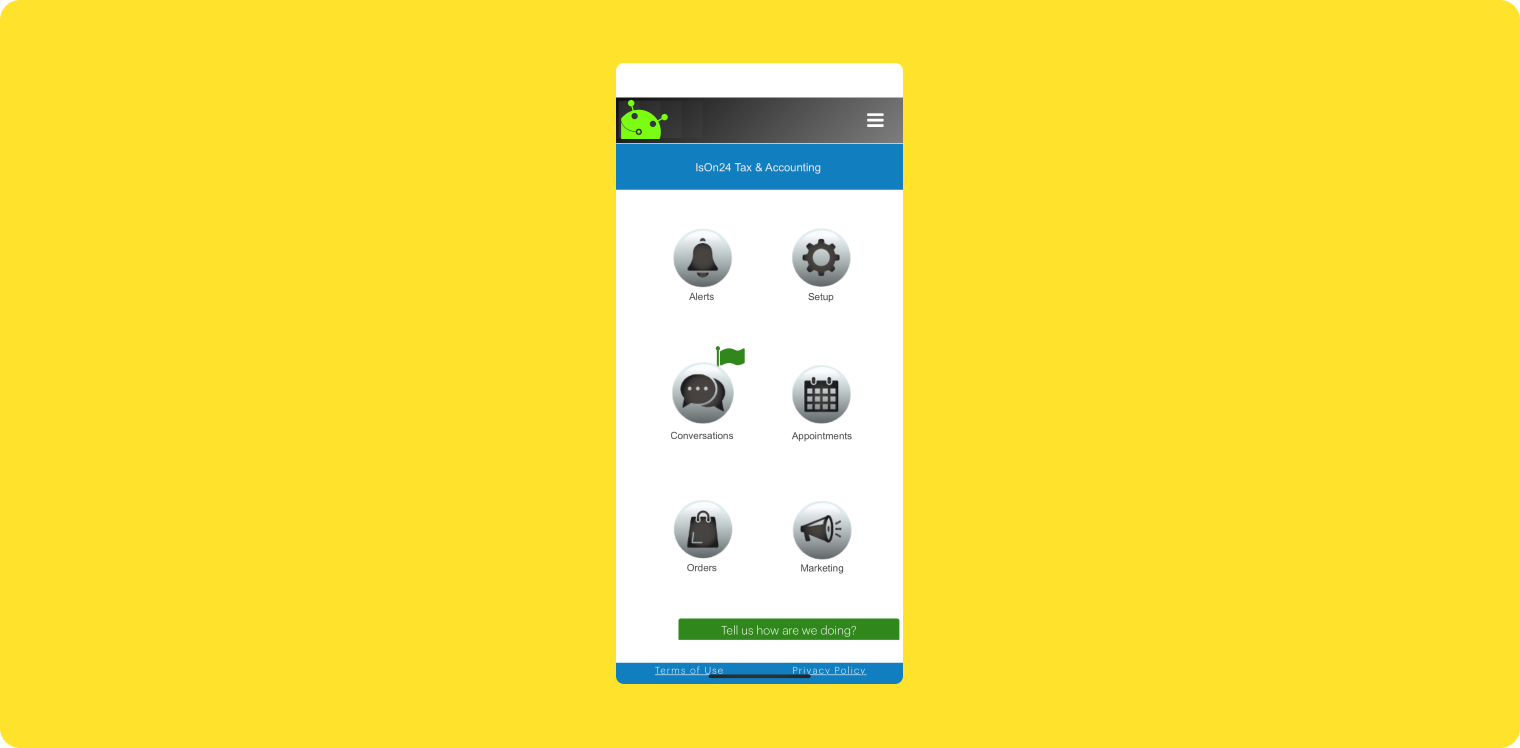
What Sets IsOn24 Apart?
IsOn24 is the oldest tool in this selection. Founded in 2014, it has gradually evolved into a full-fledged AI answering system.
While it may feel a bit dated compared to more modern services (particularly when it comes to the voices they offer), IsOn24 has a clear advantage: its affordable pricing. The entry-level plan includes 1,000 minutes of calls for just $49/month.
It also supports text messaging, which is a useful addition if you’re looking for a multi-channel solution.
IsOn24 Pricing
IsOn24 offers 3 plans:
- Starter: $49/month; includes 1,000 Minutes, 1,000 Texts and 1,000 Online replies
- Sprinter: $99/month; includes 3,000 Minutes, 3,000 Texts and 3,000 Online replies
- Cruiser: $99/month; includes 7,500 Minutes, 7,500 Texts and 7,500 Online replies
They let you try the product for free for 7 days without a credit card.

Pros and cons of IsOn24
Who Is IsOn24 Best For?
IsOn24 is ideal for companies looking for an affordable AI answering service.
Keep in mind that IsOn24 only supports English, which may be an issue if your business operates across multiple countries or serves diverse customer groups.
Frequently Asked Questions About AI Answering Services
[[faq-blog]]
What is the best AI answering service?
There’s no one-size-fits-all answer to this question. In our tests, we found Allo to be especially strong for SMBs, as it’s both affordable and efficient. Smith.ai may be a better option for companies looking for a mix of AI and human agents (and who are prepared to pay a premium for it). Goodcall is also a strong choice for companies that want an AI agent with extensive customization options.
How much does an AI answering service cost?
Most AI answering services offer entry-level plans for less than $30 per month. Plans designed for larger companies with more employees typically cost around $100 per month.
Is there a free AI voice answering service?
AI answering services typically rely on advanced algorithms and costly APIs, which is likely why there are no free AI phone answering services on the market. That said, you can try Allo, Goodcall, and Rosie free for 7 days.
What is an AI answering service?
An AI answering service is a technology-driven solution that uses artificial intelligence to automatically respond to customer inquiries and support their requests.
These services leverage natural language processing and machine learning algorithms to understand, interpret, and provide accurate answers to a wide range of questions, offering instant and efficient customer support without the need for human intervention.






.svg)
































